| On October 3, uniformed Thetsakij officers from the Bangkok Metropolitan Administration (BMA) imposed a round-the-clock ban on all vending on Sukhumvit Road, thus ending decades of unsightly stalls clogging the walkways. Despite some questionable attempts to get round this rule, the eviction is achieving its purpose and tourists and residents alike can now walk comfortably on the footpaths of the city’s busiest thoroughfare. But as Maxmilian Wechsler reports, in certain side streets the action remains the same. FOLLOWING the military coup in May 2014, the National Council for Peace and Order (NCPO) promised to “Return Happiness to Thailand”. Part of the strategy was to enforce order and discipline through measures such as regulating motorcycle taxis and public vans. Another measure was intended to reclaim the city’s footpaths and streets from vendors who had virtually taken over some parts of Bangkok in recent years. So far, that part of the campaign has been quite successful. |
| The BMA, which has direct responsibility for footpaths and streets, allowed the so-called 'markets' to flourish on its watch for years. Now the BMA has no choice but to comply with NCPO directives by evicting the offending vendors and making sure they don’t return. To enforce the NCPO’s edict, police and even soldiers were sometimes needed to help the BMA’s uniformed inspectors in confrontations with some of the more combative vendors. Previously, Thetsakij officers spent much of their time watching and following foreigners in central Bangkok including parts of Sukhumvit, hoping to catch them dropping a cigarette butt, piece of paper or drinking straw on the footpath. Offenders were made to pay a 2,000 baht fine on the spot, often with no receipt given. The practice earned Thetsakij the nickname of 'cigarette police', a title known internationally from reports in English-language newspapers and magazines. They have apparently stopped following foreigners, at least for now, and given priority to NCPO directives to clear vendors from the footpaths. For more than two decades street vendors spread uncontrollably in many areas of Bangkok, nowhere more than along lower Sukhumvit between Sois 1-21 and down the side sois. Among the most conspicuous operations were dozens of illegal mobile bars that sold alcohol until the wee hours of the morning every night from 2001 onwards. These included converted VW minivans and other vehicles parked for years in Sois 7 and 11. A lot of money was made during these years both by the street vendors and illegal bar operators, as well as those who allowed them to operate for so long. Now the mobile bars, with their flashing coloured lights, blaring speakers and openly displayed bottles of alcohol, are apparently things of the past. Many of the mobile bars and the metal containers on wheels the vendors keep their goods in were stored during non-business hours on Duang Phitak Road, parallel to Nakhon Expressway and the railway tracks. The owners, who towed their rigs to and from sales points along Sukhumvit, paid rent to a certain company which supplied guards to protect their property. Just before the BigChilli went to print the containers and the mobile bars were spotted still under guard on Duang Phitak Road, perhaps waiting patiently for a time they might be allowed back on the street. Exceptions to the rule After many years of unlimited selling hours, in August 2015 the BMA posted signs along Sukhumvit stating that vendors could sell only after 7pm. Thetsakij were out in force afterwards, patrolling the area during the daytime. They were more or less able to enforce the daytime ban, but according to some sellers, this didn’t really hurt them because most people shop after 7pm. Then, on October 3, the other shoe dropped when the ban on nighttime vending was imposed. |
When vendors were asked about the sales ban in September most declined to respond, but two Thai shop owners at Grand 5 Shopping Mall said that street vendors should be evicted by the end of the year, maybe as early as October. Turns out they were right.
It’s not likely that many people will miss the mobile bars or the vendors’ stalls packed close together along the footpaths. The goods sold on lower Sukhumvit Soi 1-21 were mostly low quality or counterfeit products like clothes, watches, bags and wallets, pirated DVDs, dangerous items – including knives, swords, parabolic batons and replica guns – cheap electronics, cheap food, sarongs, and footwear.
But despite the ban, the same vendors still manage to stay in operation day and night. They move their tables close to the walls of buildings and in front of shops or wherever they can find a space that doesn’t block the footpath.
A recent survey conducted after 10 pm revealed that many vendors display goods along Sukhumvit between Sois 1-19 and in some parts of side streets, including Soi 3, 5, 7, 9 11 and 11/1.
Soi 3/1 is full of vendors with large tables, making it difficult for vehicles to pass, although some taxis and tuk-tuks still manage to get through.
Instead of towing metal containers with goods to a particular sales point on the footpath, the vendors now have their goods packed in large bags and bring them by motorcycles that are parked on the street.
What is truly odd, however, is that some vendors, almost all of them from Myanmar, are still allowed to set up tables that openly display various types of erectile dysfunctional drugs, some fake.
Myanmar nationals still display pirated DVDs close to buildings between Sois 5-11 all day until late at night. Usually, they display only the covers and will bring the actual DVD when a buyer agrees to a sale. This technique prevents the police from arresting them for copyright violation.
The sale of these illegal items by Myanmar nationals has been going on along Sukhumvit for years, in clear violation of the law. These sellers appear to have some special privileges with respect to other vendors and are immune to either eviction or arrest. Some of them admit to being hired by a Thai boss who is looking after them.
To be fair to the BMA, it is the duty of the police to seize counterfeit or other illegal items from vendors. Thetsakij cannot arrest anyone, but they can order them to clear the footpath. For some reason the Myanmar nationals selling erectile dysfunctional drugs and pirated DVDs seem to escape the notice of Thetsakij who walk past them day and night.
BMA command post
The ban may not be completely imposed, but there’s no question that the current situation is a welcome improvement over the past when stalls were set up on both sides of the footpath and only a narrow space was left for pedestrians to squeeze their way through. A number of highly visible BMA uniformed inspectors patrol Sukhumvit on foot all day and night to make sure the enterprising vendors who used to be untouchable comply with the ban or at least stay out of the way. They know that the NCPO is behind the campaign and the old days when enterprising vendors ruled the footpaths are over.
The BMA set up a command post on the footpath between Soi 11-13. It is a tent with tables, chairs and large transceiver. Signs in English and Thai placed on both sides of the command centre invite people to fill a form in two languages with five questions to express their opinion on the 24-hour sales ban and there’s a space for suggestions.
When approached the BMA inspectors were courteous and friendly, in contrast to past encounters. They didn’t mind being photographed, and even posed for the camera and answered some questions. Khun Patanapong Jumseesing was sitting with other officers in the centre. He was very friendly and said the command post is “a permanent fixture that will be operating day and night.” When asked whether the mosquitoes would bother him and his colleagues during the night, he pointed to a large fan placed in front of the command post. Other Thetsakij also chatted freely. Basically, they said that they were ordered by their superiors to stop vendors from selling and that’s what they intended to do.
The BMA has placed large signs in Thai along Sukhumvit informing any and all of the 24-hour selling ban, and erected metal barriers in some places along the kerb of the road, probably to prevent taxis and tuk-tuks from parking.
It’s not likely that many people will miss the mobile bars or the vendors’ stalls packed close together along the footpaths. The goods sold on lower Sukhumvit Soi 1-21 were mostly low quality or counterfeit products like clothes, watches, bags and wallets, pirated DVDs, dangerous items – including knives, swords, parabolic batons and replica guns – cheap electronics, cheap food, sarongs, and footwear.
But despite the ban, the same vendors still manage to stay in operation day and night. They move their tables close to the walls of buildings and in front of shops or wherever they can find a space that doesn’t block the footpath.
A recent survey conducted after 10 pm revealed that many vendors display goods along Sukhumvit between Sois 1-19 and in some parts of side streets, including Soi 3, 5, 7, 9 11 and 11/1.
Soi 3/1 is full of vendors with large tables, making it difficult for vehicles to pass, although some taxis and tuk-tuks still manage to get through.
Instead of towing metal containers with goods to a particular sales point on the footpath, the vendors now have their goods packed in large bags and bring them by motorcycles that are parked on the street.
What is truly odd, however, is that some vendors, almost all of them from Myanmar, are still allowed to set up tables that openly display various types of erectile dysfunctional drugs, some fake.
Myanmar nationals still display pirated DVDs close to buildings between Sois 5-11 all day until late at night. Usually, they display only the covers and will bring the actual DVD when a buyer agrees to a sale. This technique prevents the police from arresting them for copyright violation.
The sale of these illegal items by Myanmar nationals has been going on along Sukhumvit for years, in clear violation of the law. These sellers appear to have some special privileges with respect to other vendors and are immune to either eviction or arrest. Some of them admit to being hired by a Thai boss who is looking after them.
To be fair to the BMA, it is the duty of the police to seize counterfeit or other illegal items from vendors. Thetsakij cannot arrest anyone, but they can order them to clear the footpath. For some reason the Myanmar nationals selling erectile dysfunctional drugs and pirated DVDs seem to escape the notice of Thetsakij who walk past them day and night.
BMA command post
The ban may not be completely imposed, but there’s no question that the current situation is a welcome improvement over the past when stalls were set up on both sides of the footpath and only a narrow space was left for pedestrians to squeeze their way through. A number of highly visible BMA uniformed inspectors patrol Sukhumvit on foot all day and night to make sure the enterprising vendors who used to be untouchable comply with the ban or at least stay out of the way. They know that the NCPO is behind the campaign and the old days when enterprising vendors ruled the footpaths are over.
The BMA set up a command post on the footpath between Soi 11-13. It is a tent with tables, chairs and large transceiver. Signs in English and Thai placed on both sides of the command centre invite people to fill a form in two languages with five questions to express their opinion on the 24-hour sales ban and there’s a space for suggestions.
When approached the BMA inspectors were courteous and friendly, in contrast to past encounters. They didn’t mind being photographed, and even posed for the camera and answered some questions. Khun Patanapong Jumseesing was sitting with other officers in the centre. He was very friendly and said the command post is “a permanent fixture that will be operating day and night.” When asked whether the mosquitoes would bother him and his colleagues during the night, he pointed to a large fan placed in front of the command post. Other Thetsakij also chatted freely. Basically, they said that they were ordered by their superiors to stop vendors from selling and that’s what they intended to do.
The BMA has placed large signs in Thai along Sukhumvit informing any and all of the 24-hour selling ban, and erected metal barriers in some places along the kerb of the road, probably to prevent taxis and tuk-tuks from parking.
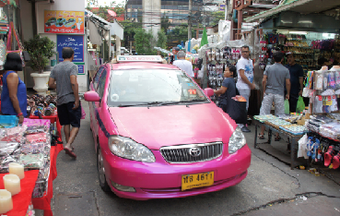 Taxi tries to navigate between vendors in Sukhumvit Soi 3/1
Taxi tries to navigate between vendors in Sukhumvit Soi 3/1 ‘Little Baghdad’
The area from Soi 3 to 5 is sometimes called ‘Little Baghdad’ because it is full of people from the Middle East and the Persian Gulf. On a side street designated Soi 3/1 it is business as usual, almost as if no restrictions on street vending had ever been imposed. It’s a mystery how some foreigners can get away with openly selling goods on the street and in the shops – at this location and others in the area without a work permit. This type of job is not supposed to be open to non-Thais.
One has to wonder how this would play with the authorities if the sellers were Westerners. It’s a safe bet they would be rounded up in no time if they weren’t already driven off by the local ‘mafias’. Apparently, this is what happens to locals.
Most sales people hardly speak Thai but are fluent in English, which is good enough for them because most of their customers are foreigners. Most of the foreign sellers will admit they are employed by a Thai national who is usually the owner of the shop or stall and may own several others.
In early September rumours started to circulate that all street selling would soon be banned around the clock. This may be why many vendors began moving to Soi 3/1, where a small new market opened starting at the mouth of the soi. Vendors sell there from afternoon until 1am or later, seven days a week.
Many shops with foreign clerks are also selling all kinds of goods on the ground floors of the air-conditioned Grand 5 Hotel & Plaza and Grand 5 Shopping Mall, opened recently inside Soi 5. The shops sell mainly clothes, footwear, bags, fashion jewellery, perfumes, health and beauty products, watches, mobile phones and accessories, cutlery, dental clinics and agarwood.
Several shops in both shopping venues openly display counterfeit bags of famous brands. The names of the shops are written only in Arabic. One large ‘secret’ shop staffed by foreigners displays fake bags. The door to this shop is usually closed, with a foreigner sitting outside the door. He will open it and invite passing foreigners, mostly from the Middle East, to come in and have a look around.
The area that might be called ‘lowest Sukhumvit’ has degenerated a lot in recent years. The beggars there are mainly foreigners, some wearing hijabs and often accompanied by children. They beg all day and night. You can see them inside Soi 3/1. Several women from a neighbouring country were observed begging along Sukhumvit as well. They were taking in quite a lot of money from passersby, even B100 notes. After a contribution the women would immediately take the money from the cup and put it into a bag, showing always an empty cup.
Foreign prostitutes continue to do business through the night on the footpath, some shouting out at passing foreign men, especially by a fast food outlet near Soi 5.
The drug peddling starts after midnight, according to a Thai woman sent to investigate. “In the evening you don’t see too many (West) Africans around Sukhumvit, but they will surface after midnight and stay until morning selling their narcotics. It’s been the same for many years,” she said. The Africans mostly hang around a one-way lane dubbed ‘Soi Africa’, a narrow dead-end lane off Sukhumvit Soi 3 where many Africans live and congregate, and where drug negotiations and sales have been going on for years.
“The Africans are very clever, and some have a lot of money. Many things are going on around Sukhumvit that you cannot see, especially involving narcotics. Nobody can understand the Africans when they talk to each other. They are always looking for women to be their drug couriers. Some local and foreign prostitutes buy drugs from them,” said the woman.
More changes coming?
There is speculation that the crackdown on vendors is part of a bigger makeover of the area, and there are some indications this may be the case. It is reported that a large new shopping plaza will be constructed in Soi 7, awaiting the demolition of the popular Beer Garden and some low-rise businesses in the soi.
Shortly before midnight on Oct 8, about 200 Royal Thai Police officers stormed ‘Soi Africa’, checking passports and in some cases conducting urine tests for drugs. Six Africans were arrested and charged with failure to carry identifying documents and testing positive for illegal drugs. Such raids have been carried out in the past and it’s too soon to tell if this was the start of a serious effort to end the almost out-in-the-open sale of illegal drugs the area is known for.
And on Sept 9, Commissioner of the Immigration Bureau Police Lt- General Nathathorn Prousoontorn instructed immigration police chiefs nationwide through a video conference to clamp down on migrant workers who illegally run businesses and take jobs reserved for Thais only under the Alien Employment Act. Among other professions, the Act applies to traders and shop assistants.
Pol Lt-Gen Nathathorn said the action aims to prevent migrants from “stealing jobs from Thais” and comes in the wake of a study by the Office of the National Economic and Social Development Board conducted at various markets and other places of business during May-June 2016. If thoroughly enacted the crackdown should leave many sales points on Sukhumvit unmanned.
The area from Soi 3 to 5 is sometimes called ‘Little Baghdad’ because it is full of people from the Middle East and the Persian Gulf. On a side street designated Soi 3/1 it is business as usual, almost as if no restrictions on street vending had ever been imposed. It’s a mystery how some foreigners can get away with openly selling goods on the street and in the shops – at this location and others in the area without a work permit. This type of job is not supposed to be open to non-Thais.
One has to wonder how this would play with the authorities if the sellers were Westerners. It’s a safe bet they would be rounded up in no time if they weren’t already driven off by the local ‘mafias’. Apparently, this is what happens to locals.
Most sales people hardly speak Thai but are fluent in English, which is good enough for them because most of their customers are foreigners. Most of the foreign sellers will admit they are employed by a Thai national who is usually the owner of the shop or stall and may own several others.
In early September rumours started to circulate that all street selling would soon be banned around the clock. This may be why many vendors began moving to Soi 3/1, where a small new market opened starting at the mouth of the soi. Vendors sell there from afternoon until 1am or later, seven days a week.
Many shops with foreign clerks are also selling all kinds of goods on the ground floors of the air-conditioned Grand 5 Hotel & Plaza and Grand 5 Shopping Mall, opened recently inside Soi 5. The shops sell mainly clothes, footwear, bags, fashion jewellery, perfumes, health and beauty products, watches, mobile phones and accessories, cutlery, dental clinics and agarwood.
Several shops in both shopping venues openly display counterfeit bags of famous brands. The names of the shops are written only in Arabic. One large ‘secret’ shop staffed by foreigners displays fake bags. The door to this shop is usually closed, with a foreigner sitting outside the door. He will open it and invite passing foreigners, mostly from the Middle East, to come in and have a look around.
The area that might be called ‘lowest Sukhumvit’ has degenerated a lot in recent years. The beggars there are mainly foreigners, some wearing hijabs and often accompanied by children. They beg all day and night. You can see them inside Soi 3/1. Several women from a neighbouring country were observed begging along Sukhumvit as well. They were taking in quite a lot of money from passersby, even B100 notes. After a contribution the women would immediately take the money from the cup and put it into a bag, showing always an empty cup.
Foreign prostitutes continue to do business through the night on the footpath, some shouting out at passing foreign men, especially by a fast food outlet near Soi 5.
The drug peddling starts after midnight, according to a Thai woman sent to investigate. “In the evening you don’t see too many (West) Africans around Sukhumvit, but they will surface after midnight and stay until morning selling their narcotics. It’s been the same for many years,” she said. The Africans mostly hang around a one-way lane dubbed ‘Soi Africa’, a narrow dead-end lane off Sukhumvit Soi 3 where many Africans live and congregate, and where drug negotiations and sales have been going on for years.
“The Africans are very clever, and some have a lot of money. Many things are going on around Sukhumvit that you cannot see, especially involving narcotics. Nobody can understand the Africans when they talk to each other. They are always looking for women to be their drug couriers. Some local and foreign prostitutes buy drugs from them,” said the woman.
More changes coming?
There is speculation that the crackdown on vendors is part of a bigger makeover of the area, and there are some indications this may be the case. It is reported that a large new shopping plaza will be constructed in Soi 7, awaiting the demolition of the popular Beer Garden and some low-rise businesses in the soi.
Shortly before midnight on Oct 8, about 200 Royal Thai Police officers stormed ‘Soi Africa’, checking passports and in some cases conducting urine tests for drugs. Six Africans were arrested and charged with failure to carry identifying documents and testing positive for illegal drugs. Such raids have been carried out in the past and it’s too soon to tell if this was the start of a serious effort to end the almost out-in-the-open sale of illegal drugs the area is known for.
And on Sept 9, Commissioner of the Immigration Bureau Police Lt- General Nathathorn Prousoontorn instructed immigration police chiefs nationwide through a video conference to clamp down on migrant workers who illegally run businesses and take jobs reserved for Thais only under the Alien Employment Act. Among other professions, the Act applies to traders and shop assistants.
Pol Lt-Gen Nathathorn said the action aims to prevent migrants from “stealing jobs from Thais” and comes in the wake of a study by the Office of the National Economic and Social Development Board conducted at various markets and other places of business during May-June 2016. If thoroughly enacted the crackdown should leave many sales points on Sukhumvit unmanned.

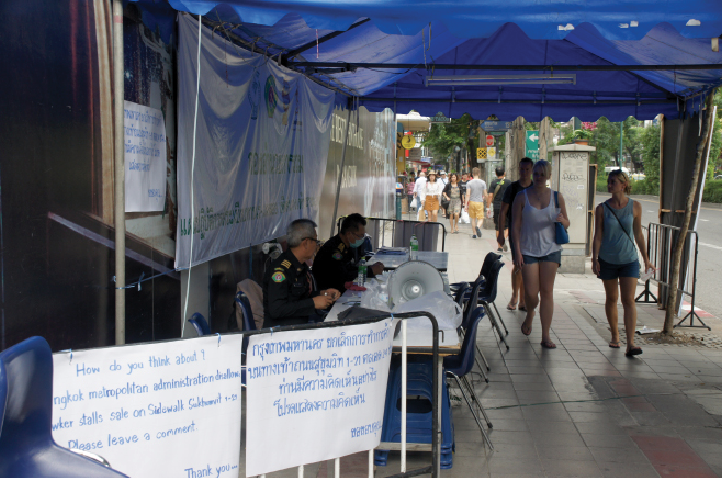
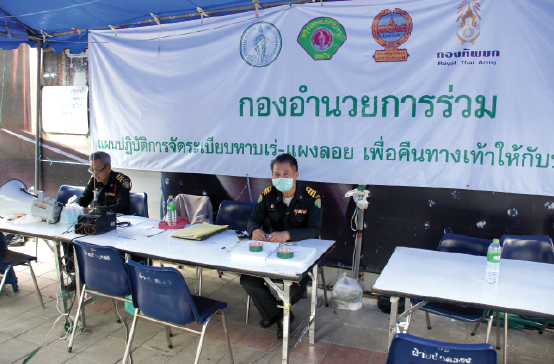
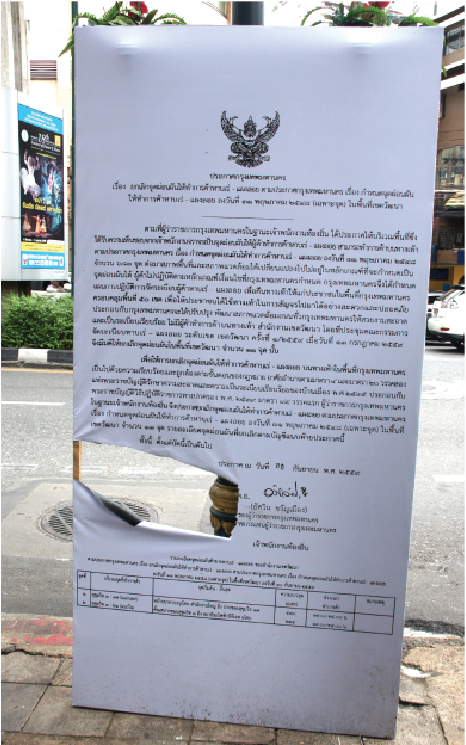
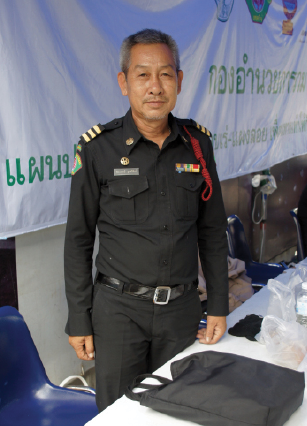
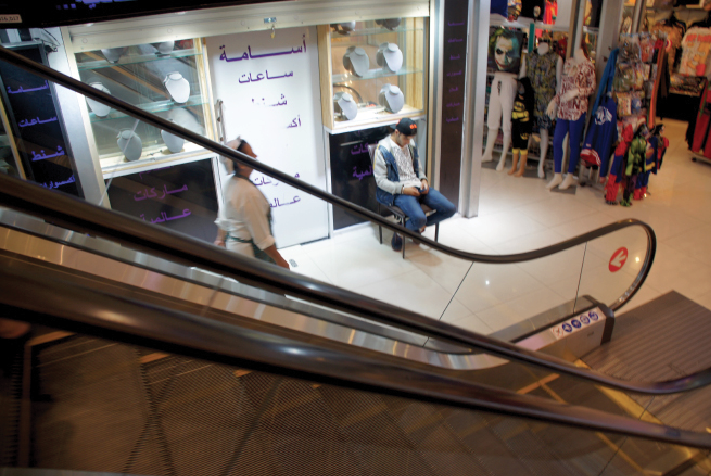
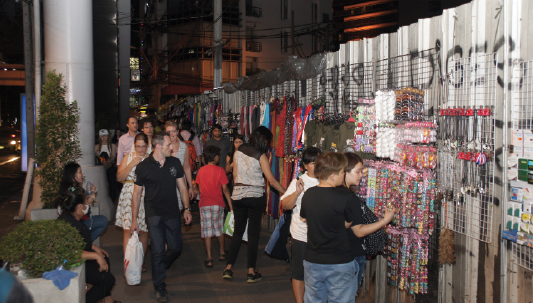
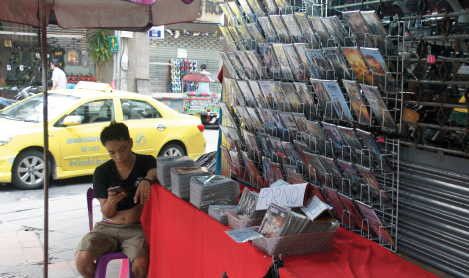
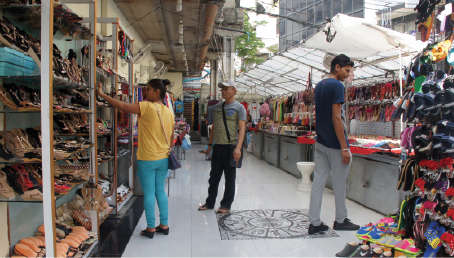
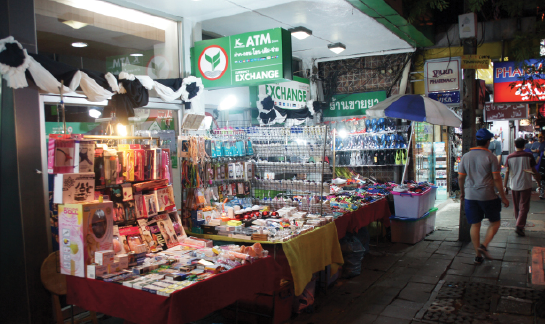
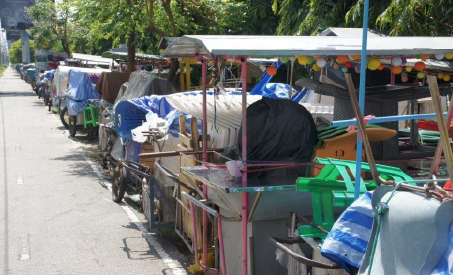
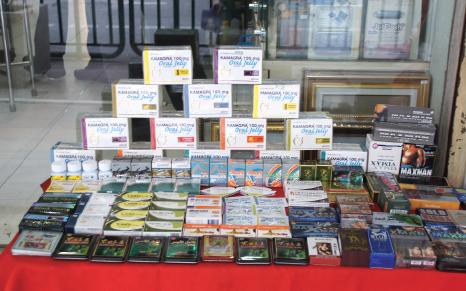
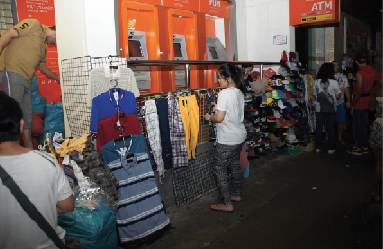
 RSS Feed
RSS Feed
















